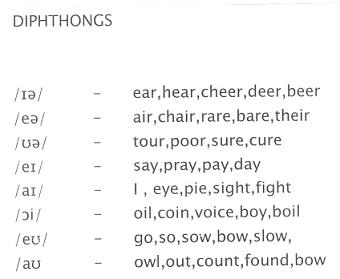English Pronunciation : Diphthongs
English Pronunciation Index
Diphthongs are types of vowels where two vowel sounds are connected in a continuous, gliding motion. They are often referred to as gliding vowels. Most languages have a number of diphthongs, although that number varies widely, from only one or two to fifteen or more.
An example of a diphthong can be seen in the word mouse, in which the ou part of the word obviously consists of two distinct vowels, but there is no syllabic break between the two.
Diphthongs can usually be seen as having two distinct parts — the nucleus, and the off-glide. The nucleus of the diphthong is the vowel that is most stressed, and forms the center of the sound, while the off-glide is the vowel which seems to flow into or off of the nucleus vowel.
The three major diphthongs in Standard English, which are known as phonemic diphthongs, are ai, aw and oy. All three of these diphthongs are very common, and many people simply think of them as single vowels in some contexts. For example, in the English word ride, the i would be transcribed phonetically as ai. Although it appears as a single letter in our writing, it actually consists of two vowels — if you say the word you should be able to hear the two. Similarly, the word how contains the diphthong aw at the end, and the word boy contains the diphthong oy.
Other diphthongs in Standard English are the ei sound in the word fame or the pronunciation of the letter a and the ou sound in the word phone. Other languages have many more diphthongs aside from these and other dialects of English may have more diphthongs as well. Languages such as Finnish have nearly twenty diphthongs, while the Received Pronunciation dialect of English has an extra five or so diphthongs not found in Standard English.
In addition to diphthongs and monophthongs, there are also what are called triphthongs. These are similar to diphthongs, but instead of moving simply from one vowel sound to another, a third sound is also added.
Diphthongs are types of vowels where two vowel sounds are connected in a continuous, gliding motion. They are often referred to as gliding vowels. Most languages have a number of diphthongs, although that number varies widely, from only one or two to fifteen or more.
An example of a diphthong can be seen in the word mouse, in which the ou part of the word obviously consists of two distinct vowels, but there is no syllabic break between the two.
Diphthongs can usually be seen as having two distinct parts — the nucleus, and the off-glide. The nucleus of the diphthong is the vowel that is most stressed, and forms the center of the sound, while the off-glide is the vowel which seems to flow into or off of the nucleus vowel.
The three major diphthongs in Standard English, which are known as phonemic diphthongs, are ai, aw and oy. All three of these diphthongs are very common, and many people simply think of them as single vowels in some contexts. For example, in the English word ride, the i would be transcribed phonetically as ai. Although it appears as a single letter in our writing, it actually consists of two vowels — if you say the word you should be able to hear the two. Similarly, the word how contains the diphthong aw at the end, and the word boy contains the diphthong oy.
Other diphthongs in Standard English are the ei sound in the word fame or the pronunciation of the letter a and the ou sound in the word phone. Other languages have many more diphthongs aside from these and other dialects of English may have more diphthongs as well. Languages such as Finnish have nearly twenty diphthongs, while the Received Pronunciation dialect of English has an extra five or so diphthongs not found in Standard English.
In addition to diphthongs and monophthongs, there are also what are called triphthongs. These are similar to diphthongs, but instead of moving simply from one vowel sound to another, a third sound is also added.

English Pronunciation Index
| Share this page: | ||




Would you prefer to share this page with others by linking to it?